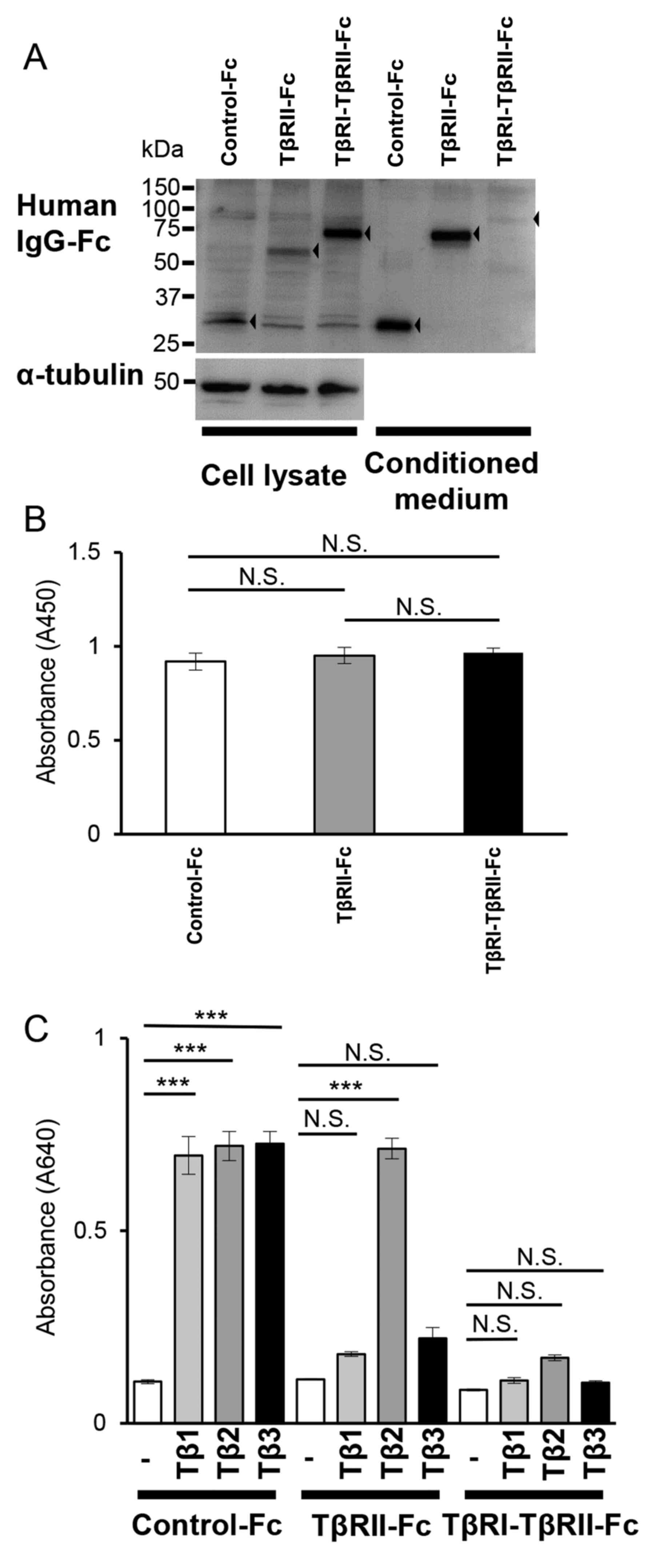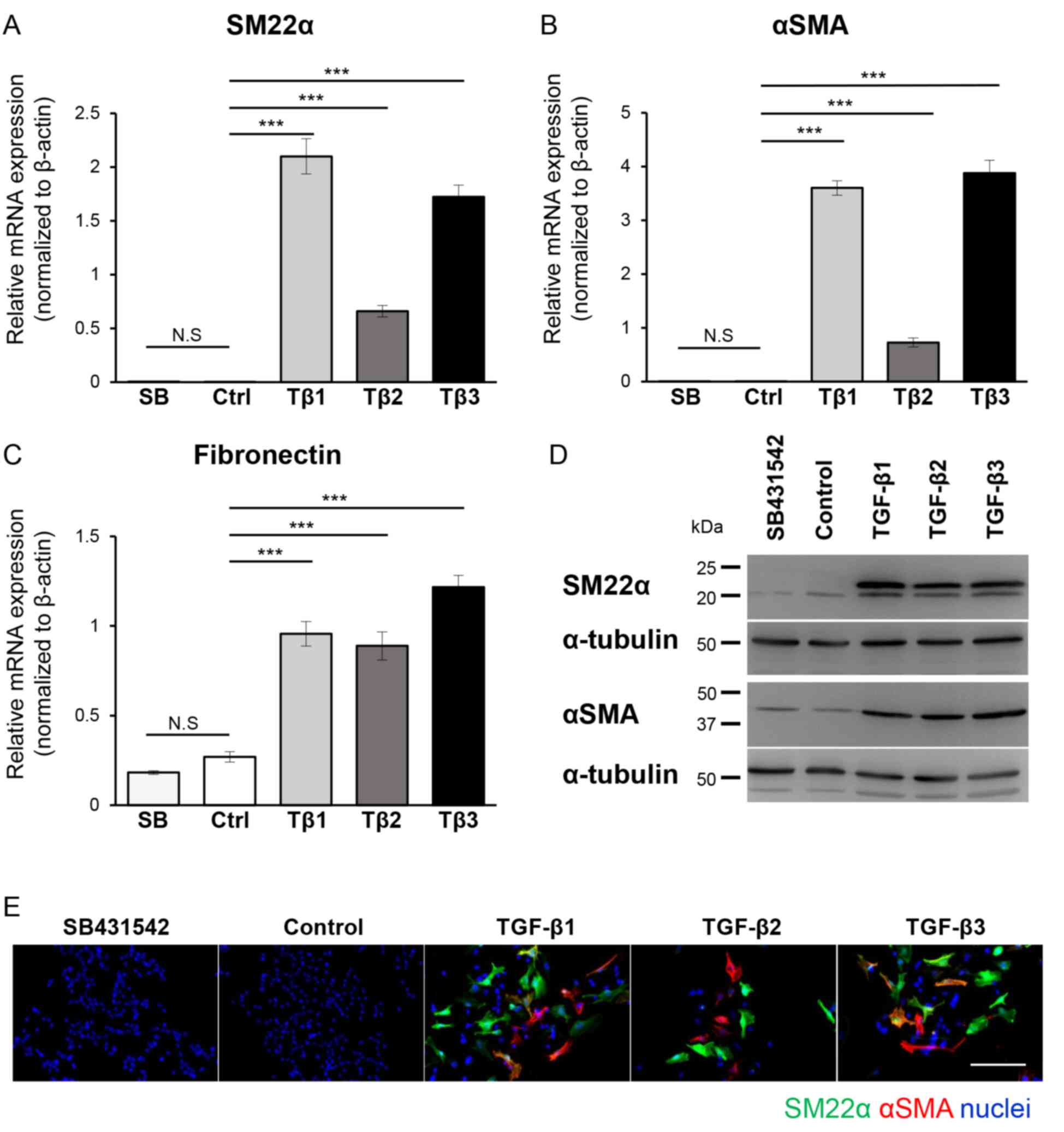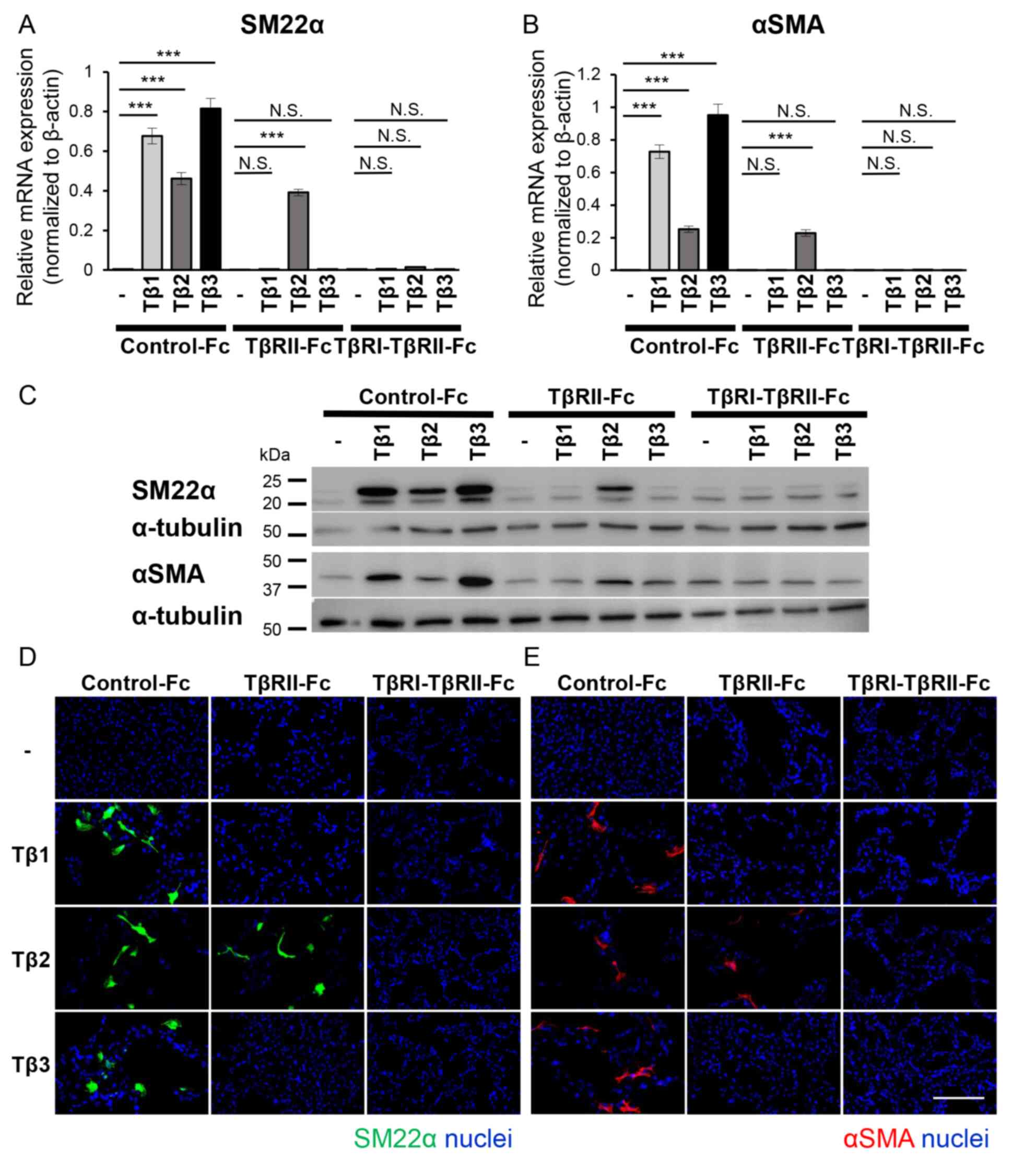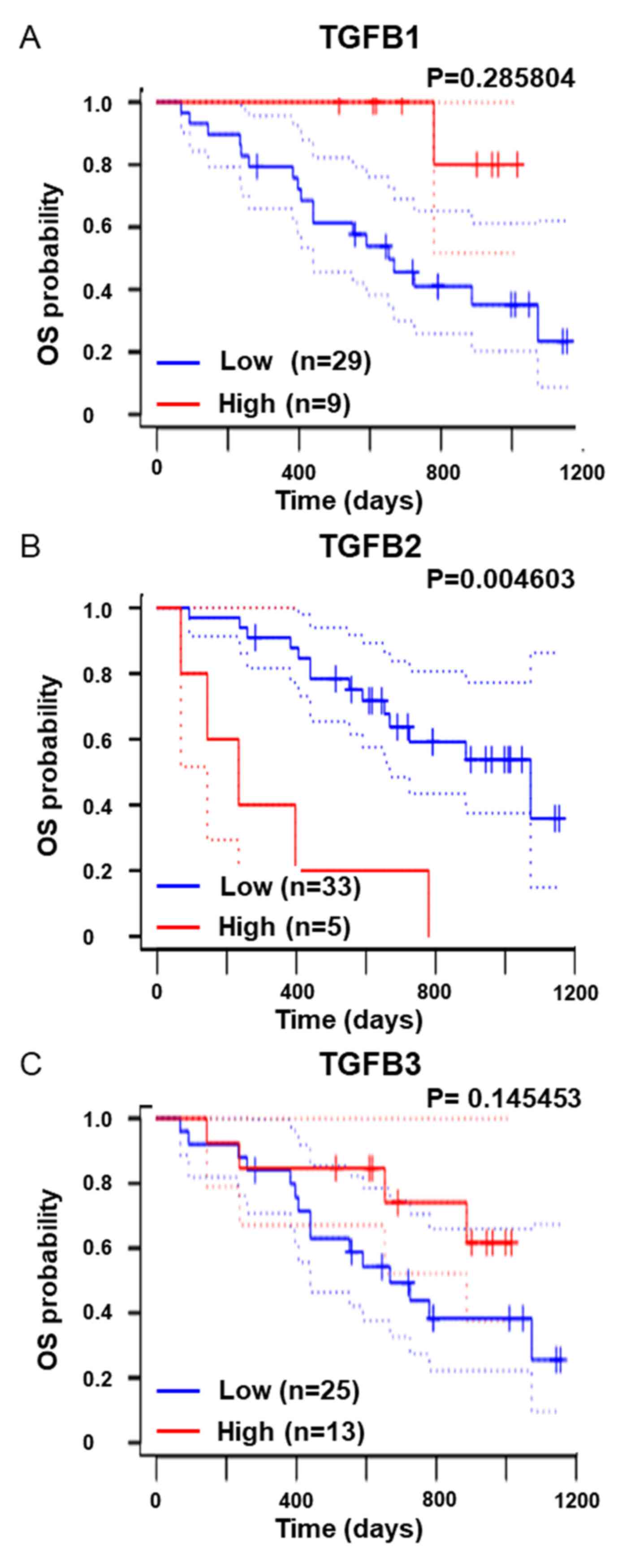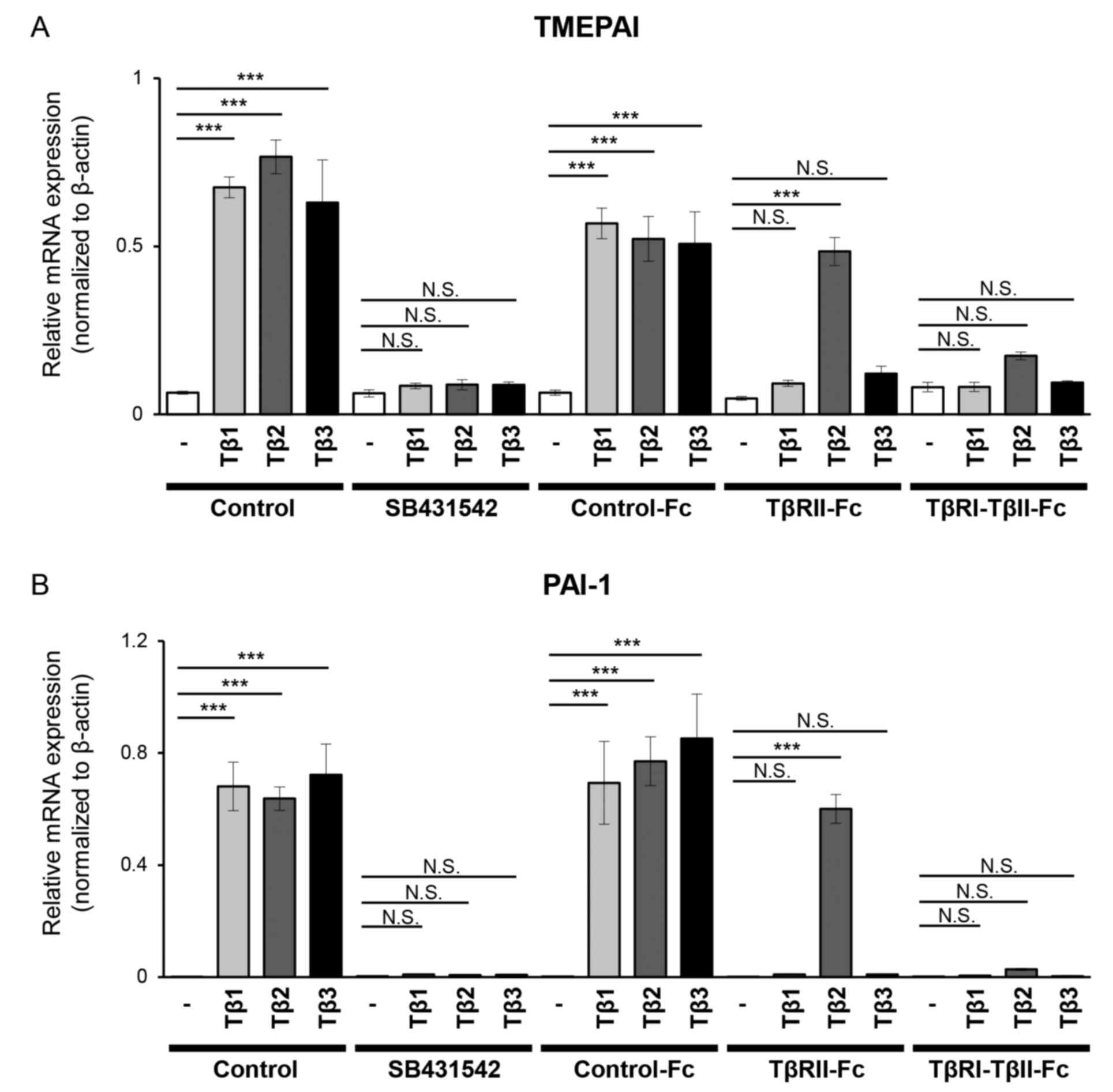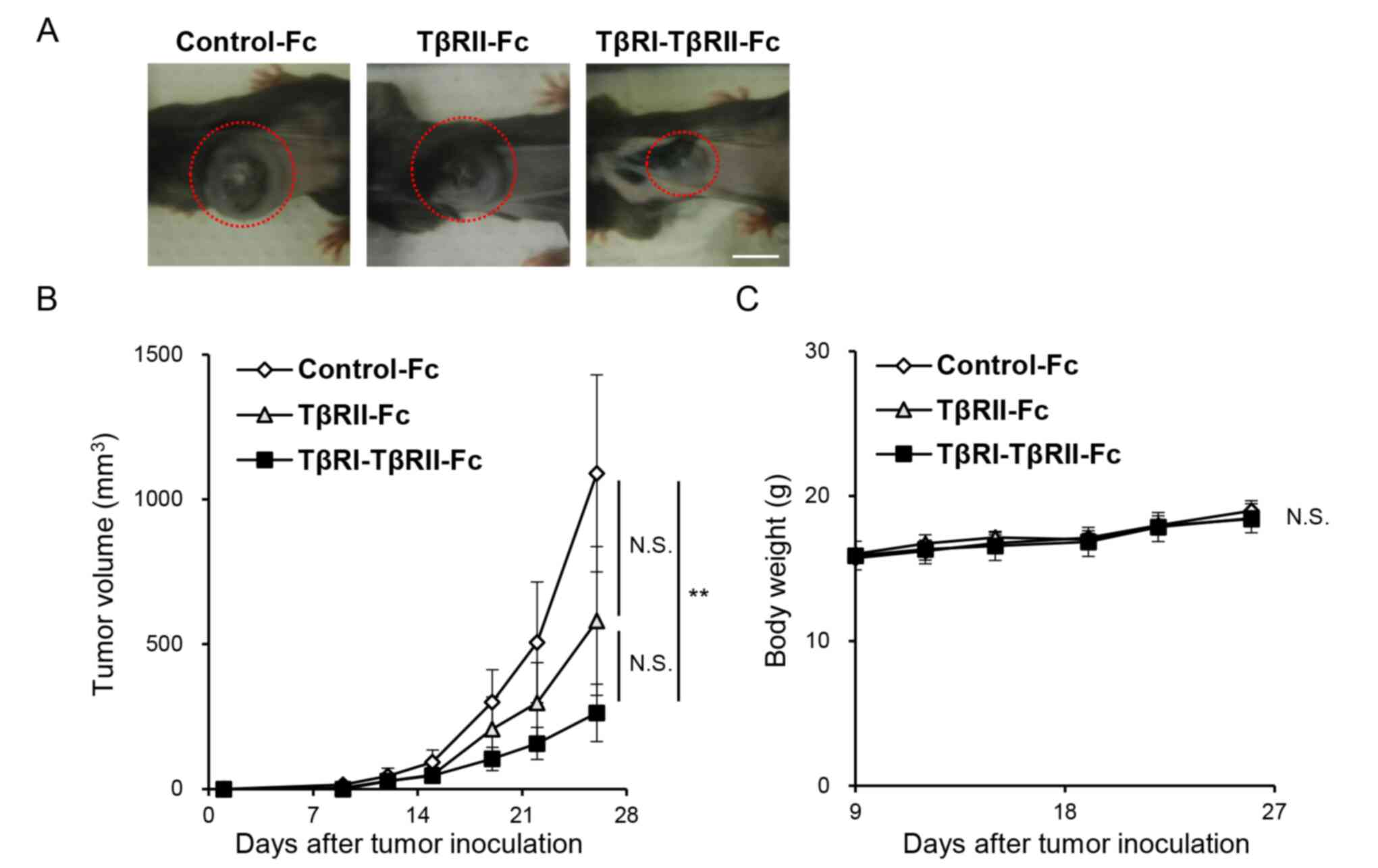|
1
|
Falcone I, Conciatori F, Bazzichetto C,
Ferretti G, Cognetti F, Ciuffreda L and Milella M: Tumor
microenvironment: Implications in melanoma resistance to targeted
therapy and immunotherapy. Cancers (Basel). 12:28702020. View Article : Google Scholar : PubMed/NCBI
|
|
2
|
Miyazono K, Katsuno Y, Koinuma D, Ehata S
and Morikawa M: Intracellular and extracellular TGF-beta signaling
in cancer: Some recent topics. Front Med. 12:387–411. 2018.
View Article : Google Scholar : PubMed/NCBI
|
|
3
|
Heldin CH and Moustakas A: Signaling
receptors for TGF-β family members. Cold Spring Harb Perspect Biol.
8:a0220532016. View Article : Google Scholar : PubMed/NCBI
|
|
4
|
Dennler S, Itoh S, Vivien D, ten Dijke P,
Huet S and Gauthier JM: Direct binding of Smad3 and Smad4 to
critical TGF beta-inducible elements in the promoter of human
plasminogen activator inhibitor-type 1 gene. EMBO J. 17:3091–3100.
1998. View Article : Google Scholar : PubMed/NCBI
|
|
5
|
Watanabe Y, Itoh S, Goto T, Ohnishi E,
Inamitsu M, Itoh F, Satoh K, Wiercinska E, Yang W, Shi L, et al:
TMEPAI, a transmembrane TGF-beta-inducible protein, sequesters Smad
proteins from active participation in TGF-beta signaling. Mol Cell.
37:123–134. 2010. View Article : Google Scholar : PubMed/NCBI
|
|
6
|
Morikawa M, Derynck R and Miyazono K:
TGF-beta and the TGF-β family: Context-dependent roles in cell and
tissue physiology. Cold Spring Harb Perspect Biol. 8:a0218732016.
View Article : Google Scholar : PubMed/NCBI
|
|
7
|
Batlle E and Massagué J: Transforming
growth factor-β signaling in immunity and cancer. Immunity.
50:924–940. 2019. View Article : Google Scholar : PubMed/NCBI
|
|
8
|
Katsuno Y, Lamouille S and Derynck R:
TGF-β signaling and epithelial-mesenchymal transition in cancer
progression. Curr Opin Oncol. 25:76–84. 2013. View Article : Google Scholar : PubMed/NCBI
|
|
9
|
Moustakas A and Heldin CH: Mechanisms of
TGFβ-induced epithelial-mesenchymal transition. J Clin Med.
5:632016. View Article : Google Scholar : PubMed/NCBI
|
|
10
|
Caramel J, Papadogeorgakis E, Hill L,
Browne GJ, Richard G, Wierinckx A, Saldanha G, Osborne J,
Hutchinson P, Tse G, et al: A switch in the expression of embryonic
EMT-inducers drives the development of malignant melanoma. Cancer
Cell. 24:466–480. 2013. View Article : Google Scholar : PubMed/NCBI
|
|
11
|
Heppt MV, Wang JX, Hristova DM, Wei Z, Li
L, Evans B, Beqiri M, Zaman S, Zhang J, Irmler M, et al:
MSX1-induced neural crest-like reprogramming promotes melanoma
progression. J Invest Dermatol. 138:141–149. 2018. View Article : Google Scholar : PubMed/NCBI
|
|
12
|
Javelaud D, Alexaki VI and Mauviel A:
Transforming growth factor-beta in cutaneous melanoma. Pigment Cell
Melanoma Res. 21:123–132. 2008. View Article : Google Scholar : PubMed/NCBI
|
|
13
|
Reed JA, McNutt NS, Prieto VG and Albino
AP: Expression of transforming growth factor-beta 2 in malignant
melanoma correlates with the depth of tumor invasion. Implications
for tumor progression. Am J Pathol. 145:97–104. 1994.PubMed/NCBI
|
|
14
|
Cantelli G, Orgaz JL, Rodriguez-Hernandez
I, Karagiannis P, Maiques O, Matias-Guiu X, Nestle FO, Marti RM,
Karagiannis SN and Sanz-Moreno V: TGF-β-induced transcription
sustains amoeboid melanoma migration and dissemination. Curr Biol.
25:2899–2914. 2015. View Article : Google Scholar : PubMed/NCBI
|
|
15
|
Ramont L, Pasco S, Hornebeck W, Maquart FX
and Monboisse JC: Transforming growth factor-beta1 inhibits tumor
growth in a mouse melanoma model by down-regulating the plasminogen
activation system. Exp Cell Res. 291:1–10. 2003. View Article : Google Scholar : PubMed/NCBI
|
|
16
|
Schlegel NC, von Planta A, Widmer DS,
Dummer R and Christofori G: PI3K signalling is required for a
TGFβ-induced epithelial-mesenchymal-like transition (EMT-like) in
human melanoma cells. Exp Dermatol. 24:22–28. 2015. View Article : Google Scholar : PubMed/NCBI
|
|
17
|
Tuncer E, Calçada RR, Zingg D, Varum S,
Cheng P, Freiberger SN, Deng CX, Kleiter I, Levesque MP, Dummer R
and Sommer L: SMAD signaling promotes melanoma metastasis
independently of phenotype switching. J Clin Invest. 129:2702–2716.
2019. View Article : Google Scholar : PubMed/NCBI
|
|
18
|
Díaz-Valdés N, Basagoiti M, Dotor J,
Aranda F, Monreal I, Riezu-Boj JI, Borrás-Cuesta F, Sarobe P and
Feijoó E: Induction of monocyte chemoattractant protein-1 and
interleukin-10 by TGFbeta1 in melanoma enhances tumor infiltration
and immunosuppression. Cancer Res. 71:812–821. 2011. View Article : Google Scholar
|
|
19
|
Okamoto H, Yoshimatsu Y, Tomizawa T,
Kunita A, Takayama R, Morikawa T, Komura D, Takahashi K, Oshima T,
Sato M, et al: Interleukin-13 receptor α2 is a novel marker and
potential therapeutic target for human melanoma. Sci Rep.
9:12812019. View Article : Google Scholar : PubMed/NCBI
|
|
20
|
Chapman PB, Hauschild A, Robert C, Haanen
JB, Ascierto P, Larkin J, Dummer R, Garbe C, Testori A, Maio M, et
al: Improved survival with vemurafenib in melanoma with BRAF V600E
mutation. N Engl J Med. 364:2507–2516. 2011. View Article : Google Scholar : PubMed/NCBI
|
|
21
|
Hauschild A, Grob JJ, Demidov LV, Jouary
T, Gutzmer R, Millward M, Rutkowski P, Blank CU, Miller WH Jr,
Kaempgen E, et al: Dabrafenib in BRAF-mutated metastatic melanoma:
A multicentre, open-label, phase 3 randomised controlled trial.
Lancet. 380:358–365. 2012. View Article : Google Scholar : PubMed/NCBI
|
|
22
|
Flaherty KT, Infante JR, Daud A, Gonzalez
R, Kefford RF, Sosman J, Hamid O, Schuchter L, Cebon J, Ibrahim N,
et al: Combined BRAF and MEK inhibition in melanoma with BRAF V600
mutations. N Engl J Med. 367:1694–1703. 2012. View Article : Google Scholar : PubMed/NCBI
|
|
23
|
Schlingensiepen KH, Schlingensiepen R,
Steinbrecher A, Hau P, Bogdahn U, Fischer-Blass B and Jachimczak P:
Targeted tumor therapy with the TGF-beta 2 antisense compound AP
12009. Cytokine Growth Factor Rev. 17:129–139. 2006. View Article : Google Scholar : PubMed/NCBI
|
|
24
|
Morris JC, Tan AR, Olencki TE, Shapiro GI,
Dezube BJ, Reiss M, Hsu FJ, Berzofsky JA and Lawrence DP: Phase I
study of GC1008 (fresolimumab): A human anti-transforming growth
factor-beta (TGFβ) monoclonal antibody in patients with advanced
malignant melanoma or renal cell carcinoma. PLoS One. 9:e903532014.
View Article : Google Scholar : PubMed/NCBI
|
|
25
|
Jin CH, Krishnaiah M, Sreenu D,
Subrahmanyam VB, Rao KS, Lee HJ, Park SJ, Park HJ, Lee K, Sheen YY
and Kim DK: Discovery of
N-((4-([1,2,4]triazolo[1,5-a]pyridin-6-yl)-5-(6-methylpyridin-2-yl)-1H-imidazol-2-yl)methyl)-2-fluoroaniline
(EW-7197): A highly potent, selective, and orally bioavailable
inhibitor of TGF-β type I receptor kinase as cancer
immunotherapeutic/antifibrotic agent. J Med Chem. 57:4213–4238.
2014. View Article : Google Scholar : PubMed/NCBI
|
|
26
|
Colak S and Ten Dijke P: Targeting TGF-β
signaling in cancer. Trends Cancer. 3:56–71. 2017. View Article : Google Scholar : PubMed/NCBI
|
|
27
|
Roopenian DC and Akilesh S: FcRn: The
neonatal Fc receptor comes of age. Nat Rev Immunol. 7:715–725.
2007. View Article : Google Scholar : PubMed/NCBI
|
|
28
|
Czajkowsky DM, Hu J, Shao Z and Pleass RJ:
Fc-fusion proteins: New developments and future perspectives. EMBO
Mol Med. 4:1015–1028. 2012. View Article : Google Scholar : PubMed/NCBI
|
|
29
|
Duivelshof BL, Murisier A, Camperi J,
Fekete S, Beck A, Guillarme D and D'Atri V: Therapeutic Fc-fusion
proteins: Current analytical strategies. J Sep Sci. 44:35–62. 2021.
View Article : Google Scholar : PubMed/NCBI
|
|
30
|
Marotte H and Cimaz R: Etanercept-TNF
receptor and IgG1 Fc fusion protein: Is it different from other TNF
blockers? Expert Opin Biol Ther. 14:569–572. 2014. View Article : Google Scholar : PubMed/NCBI
|
|
31
|
Takahashi K, Akatsu Y, Podyma-Inoue KA,
Matsumoto T, Takahashi H, Yoshimatsu Y, Koinuma D, Shirouzu M,
Miyazono K and Watabe T: Targeting all transforming growth factor-β
isoforms with an Fc chimeric receptor impairs tumor growth and
angiogenesis of oral squamous cell cancer. J Biol Chem.
295:12559–12572. 2020. View Article : Google Scholar : PubMed/NCBI
|
|
32
|
Mizuno H, Kitada K, Nakai K and Sarai A:
PrognoScan: A new database for meta-analysis of the prognostic
value of genes. BMC Med Genomics. 2:182009. View Article : Google Scholar : PubMed/NCBI
|
|
33
|
Bogunovic D, O'Neill DW, Belitskaya-Levy
I, Vacic V, Yu YL, Adams S, Darvishian F, Berman R, Shapiro R,
Pavlick AC, et al: Immune profile and mitotic index of metastatic
melanoma lesions enhance clinical staging in predicting patient
survival. Proc Natl Acad Sci USA. 106:20429–20434. 2009. View Article : Google Scholar : PubMed/NCBI
|
|
34
|
Pfaffl MW: Relative quantification.
Real-time PCR. Dorak MT: 1st edition. Taylor & Francis; London:
2006, https://www.taylorfrancis.com/chapters/edit/10.4324/9780203967317-12/relative-quantification-michael-pfafflPubMed/NCBI
|
|
35
|
Kawai S, Takagi Y, Kaneko S and Kurosawa
T: Effect of three types of mixed anesthetic agents alternate to
ketamine in mice. Exp Anim. 60:481–487. 2011. View Article : Google Scholar : PubMed/NCBI
|
|
36
|
Kirihara Y, Takechi M, Kurosaki K,
Kobayashi Y and Kurosawa T: Anesthetic effects of a mixture of
medetomidine, midazolam and butorphanol in two strains of mice. Exp
Anim. 62:173–180. 2013. View Article : Google Scholar : PubMed/NCBI
|
|
37
|
Kanda Y: Investigation of the freely
available easy-to-use software ‘EZR’ for medical statistics. Bone
Marrow Transplant. 48:452–458. 2013. View Article : Google Scholar : PubMed/NCBI
|
|
38
|
Krasagakis K, Thölke D, Farthmann B,
Eberle J, Mansmann U and Orfanos CE: Elevated plasma levels of
transforming growth factor (TGF)-beta1 and TGF-beta2 in patients
with disseminated malignant melanoma. Br J Cancer. 77:1492–1494.
1998. View Article : Google Scholar : PubMed/NCBI
|
|
39
|
Zhang Y, Alexander PB and Wang XF:
TGF-beta family signaling in the control of cell proliferation and
survival. Cold Spring Harb Perspect Biol. 9:a0221452017. View Article : Google Scholar : PubMed/NCBI
|
|
40
|
Penafuerte C and Galipeau J: TGF beta
secreted by B16 melanoma antagonizes cancer gene immunotherapy
bystander effect. Cancer Immunol Immunother. 57:1197–1206. 2008.
View Article : Google Scholar : PubMed/NCBI
|
|
41
|
Streit M and Detmar M: Angiogenesis,
lymphangiogenesis, and melanoma metastasis. Oncogene. 22:3172–3179.
2003. View Article : Google Scholar : PubMed/NCBI
|
|
42
|
Akatsu Y, Takahashi N, Yoshimatsu Y,
Kimuro S, Muramatsu T, Katsura A, Maishi N, Suzuki HI, Inazawa J,
Hida K, et al: Fibroblast growth factor signals regulate
transforming growth factor-β-induced endothelial-to-myofibroblast
transition of tumor endothelial cells via Elk1. Mol Oncol.
13:1706–1724. 2019. View Article : Google Scholar : PubMed/NCBI
|
|
43
|
Gong D, Shi W, Yi SJ, Chen H, Groffen J
and Heisterkamp N: TGFβ signaling plays a critical role in
promoting alternative macrophage activation. BMC Immunol.
13:312012. View Article : Google Scholar : PubMed/NCBI
|
|
44
|
Chen W and Ten Dijke P: Immunoregulation
by members of the TGFβ superfamily. Nat Rev Immunol. 16:723–740.
2016. View Article : Google Scholar : PubMed/NCBI
|
|
45
|
Liu M, Kuo F, Capistrano KJ, Kang D, Nixon
BG, Shi W, Chou C, Do MH, Stamatiades EG, Gao S, et al: TGF-β
suppresses type 2 immunity to cancer. Nature. 587:115–120. 2020.
View Article : Google Scholar : PubMed/NCBI
|
|
46
|
Kudo-Saito C, Shirako H, Takeuchi T and
Kawakami Y: Cancer metastasis is accelerated through
immunosuppression during Snail-induced EMT of cancer cells. Cancer
Cell. 15:195–206. 2009. View Article : Google Scholar : PubMed/NCBI
|
|
47
|
Qin T, Barron L, Xia L, Huang H,
Villarreal MM, Zwaagstra J, Collins C, Yang J, Zwieb C, Kodali R,
et al: A novel highly potent trivalent TGF-β receptor trap inhibits
early-stage tumorigenesis and tumor cell invasion in murine
Pten-deficient prostate glands. Oncotarget. 7:86087–86102. 2016.
View Article : Google Scholar : PubMed/NCBI
|
|
48
|
Muraoka RS, Dumont N, Ritter CA, Dugger
TC, Brantley DM, Chen J, Easterly E, Roebuck LR, Ryan S, Gotwals
PJ, et al: Blockade of TGF-beta inhibits mammary tumor cell
viability, migration, and metastases. J Clin Invest. 109:1551–1559.
2002. View Article : Google Scholar : PubMed/NCBI
|
|
49
|
Yung LM, Nikolic I, Paskin-Flerlage SD,
Pearsall RS, Kumar R and Yu PB: A selective transforming growth
factor-β ligand trap attenuates pulmonary hypertension. Am J Respir
Crit Care Med. 194:1140–1151. 2016. View Article : Google Scholar : PubMed/NCBI
|
|
50
|
Mohammad KS, Javelaud D, Fournier PG,
Niewolna M, McKenna CR, Peng XH, Duong V, Dunn LK, Mauviel A and
Guise TA: TGF-β-RI kinase inhibitor SD-208 reduces the development
and progression of melanoma bone metastases. Cancer Res.
71:175–184. 2011. View Article : Google Scholar : PubMed/NCBI
|
|
51
|
Javelaud D, Alexaki VI, Dennler S,
Mohammad KS, Guise TA and Mauviel A: The TGF-β/SMAD/GLI2 signaling
axis in cancer progression and metastasis. Cancer Res.
71:5606–5610. 2011. View Article : Google Scholar : PubMed/NCBI
|















